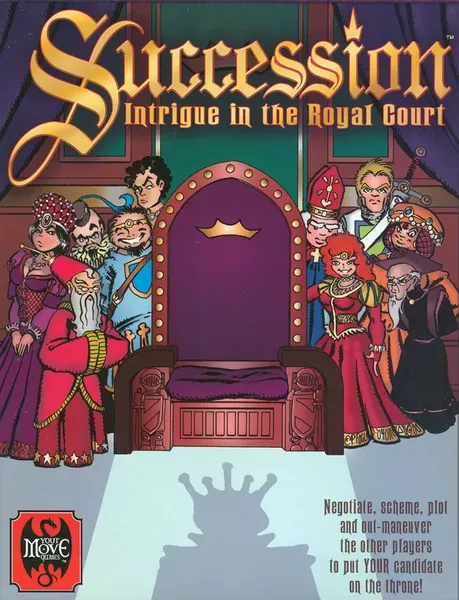Succession: Intrigue in the Royal Court
So, his Majesty the King is aging and it's time to talk about new candidates for the throne. You? Don't be silly. You're merely a humble courtier or a lowly peon. Instead, you plot to put your preferred candidate on the throne, indebting them to yourself along the way.

This is the core conceit of Succession: Intrigue in the Royal Court and one that sets you up for several hours of plotting and intrigue. The game was published in 2004. (One of the aims of this blog is to give more visibility to somewhat forgotten treasures of the past. There's plenty of people out there for those that want to know about the new hotness, but my view is good games are good games regardless of when they were published. But I digress and may come back to this subject in the future).
At it's heart, Succession: Intrigue in the Royal Court game, with the qualifier you shouldn't be expecting it to provide the same kind of deep negotiation experience as Republic of Rome or Sidereal Conference. It's very much a take that game, with the negotiations very much centered round who you're going to help and who you're going to screw over.
The way it does that however is rather clever. You do this by playing "intrigue" cards, which have various schemes to raise the standing of some candidates and lower the standings of other. What complicates this however, is that all voting is secret until it's time to reveal the results. So until the gold is spent and the cards are played, you can never be quite sure exactly how it's going to turn out.
Even more critically, the candidates will assign credit or blame to the courtiers, taking away favour from their opponents and giving it to those who support their candidacy.
According to the proposer of the scheme? Nothing so simple. Whoever put the highest number of votes down, regardless of how they voted or if the scheme is implemented, gets to control the narrative. And you can only win if the new monarch favours you more than any other supporter.
For those of an evil bent, this is rather marvelous. There's no feeling quite like lowering the standing of your opponent's candidate for the crown, then making sure said candidate blames them for the loss of standing.
Some will be rubbing their hands in glee on reading that, others will be looking at it with horror. And that likely tells you whether this game is for you or not.
The other thing that really stands out is the commitment to asymmetry. If your courtier is the taxman, as you'd imagine, you get extra money. This frequently leads to a tactic that involves large amounts of bribes and votes buying. The foreign ambassador on the other hand is able to slither out of any negative consequences of being assigned blame. This leads to a playstyle of slimy threats and offers to "take the blame" from other courtiers in exchange for gold.
The same is true of the candidates. Ulysses is the King's Son and as such starts with the highest standing with the King. He's also a big numpty which means he loses extra standing when a scheme is enacted to reduce it and can only gain a single standing from positive schemes. This generally means that Ulysees either wins very early in the game or quickly becomes nonviable. My favourite is probably the wealthy merchant Venetia who has no real claim to the throne, but gives money to anyone she feels has increased her standing. In most of our games, this generally leads to her being included in positive schemes (many allow you to affect more than one candidate) early on then ruthlessly abandoned once the game gets going!
This is a real strong point for me. It leads to each courtier being very different in terms of strategy and also helps provide a light but coherent narrative.
Add some lovely cartoonish art from Phil and Kaja Folio and that's pretty much the game.
Possible criticisms of the game?
Like most take that games, it's not one that's great at low player counts. I wouldn't recommend it for less than four players and the full five is preferable.
Some will feel that it's not particularly balanced in terms of starting characters. I traditionally have little time for that complaint in take that games (where the other players are the balancing factor) but it's one I'm pretty sure some will have.
It also can go on a little bit too long, especially if your group is into lengthy negotiating before each vote.
Overall though, it's a reasonably light and fun game, for the right group. It is very group dependent however, more than most games. If you play it with a very serious group who are all about optimal strategies and careful calculations. If you play it with the kind of group who giggle as they screw each other over and/or get into the roleplaying aspects and start giving pantomime villain monologues, you'll have a whale of a time.
Side note: I am no longer doing numerical scores because honestly they were just being picked out of the ether on a whim anyway and that didn't feel useful.